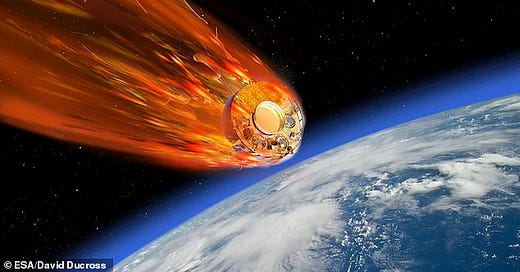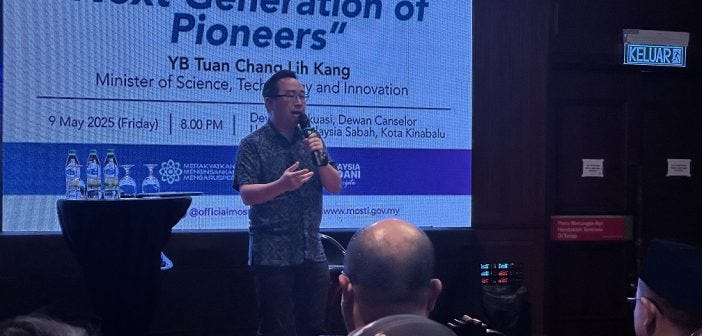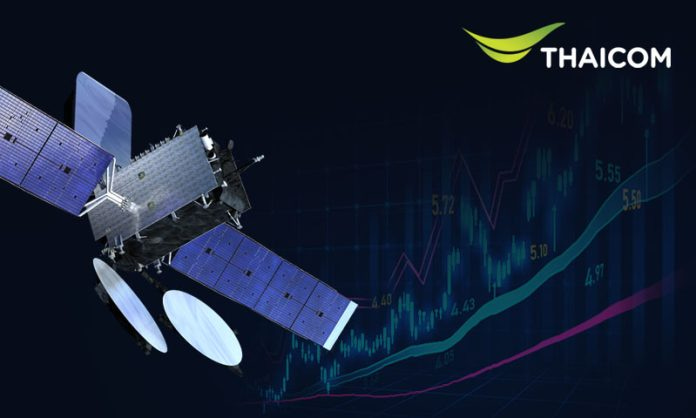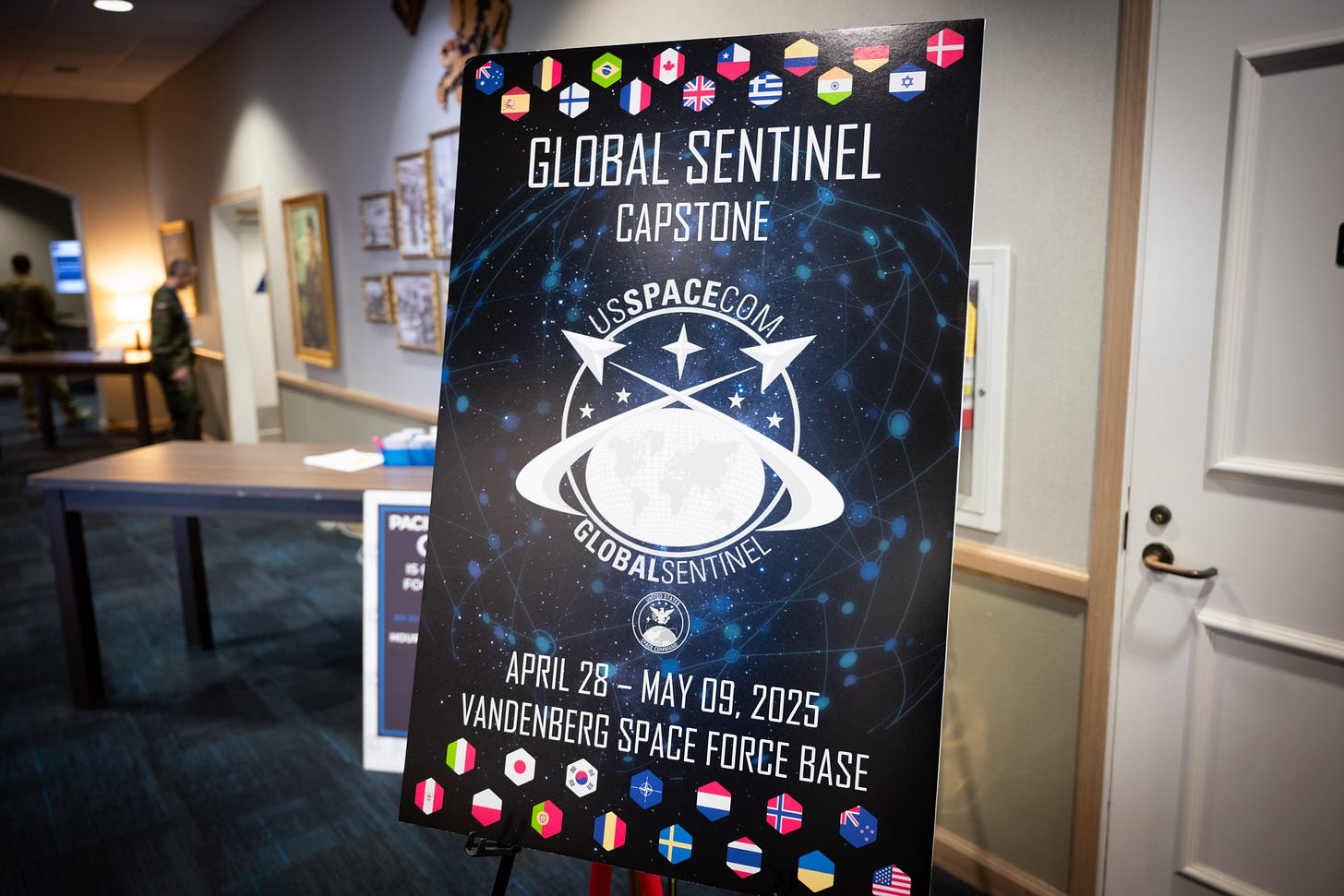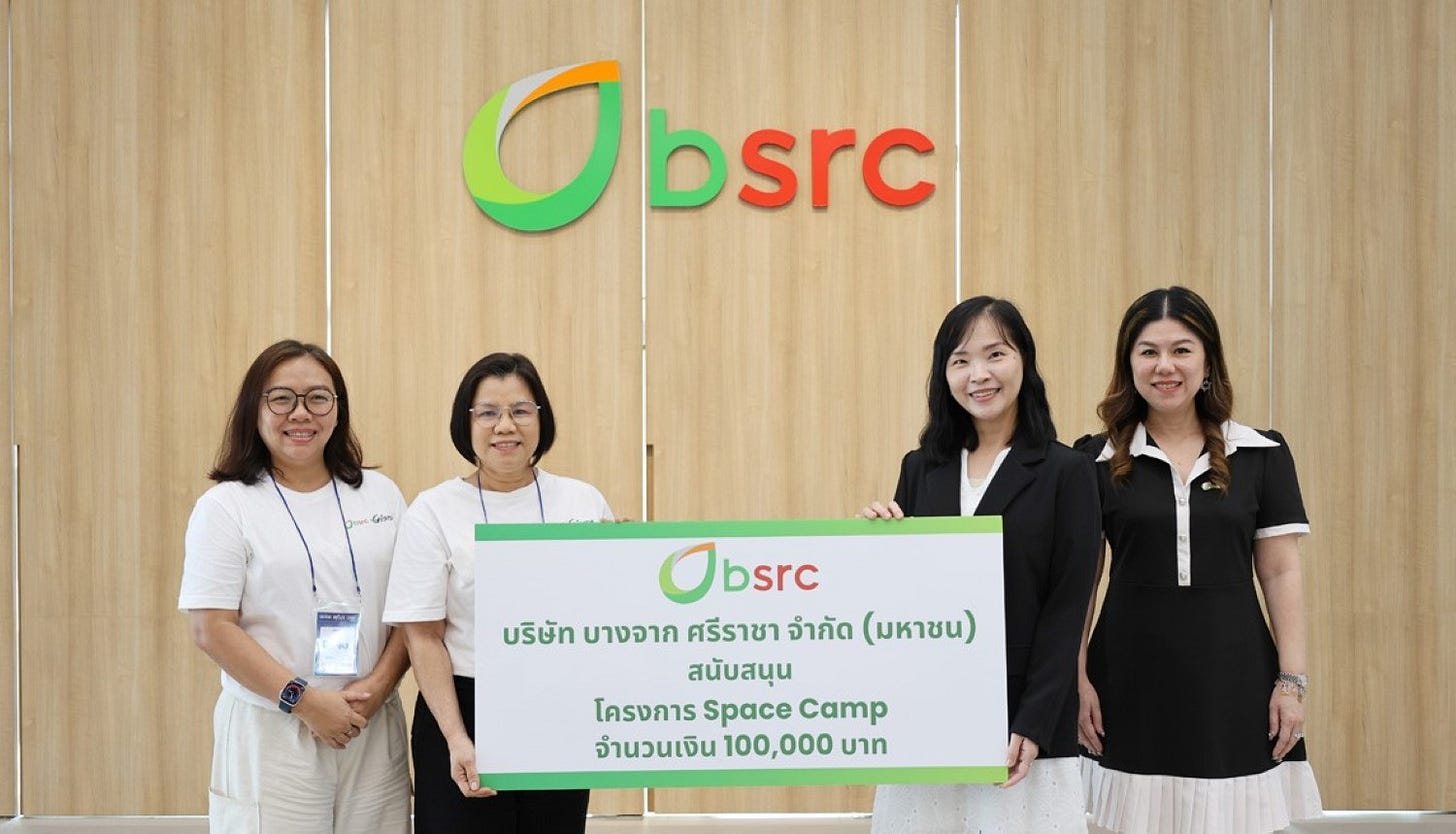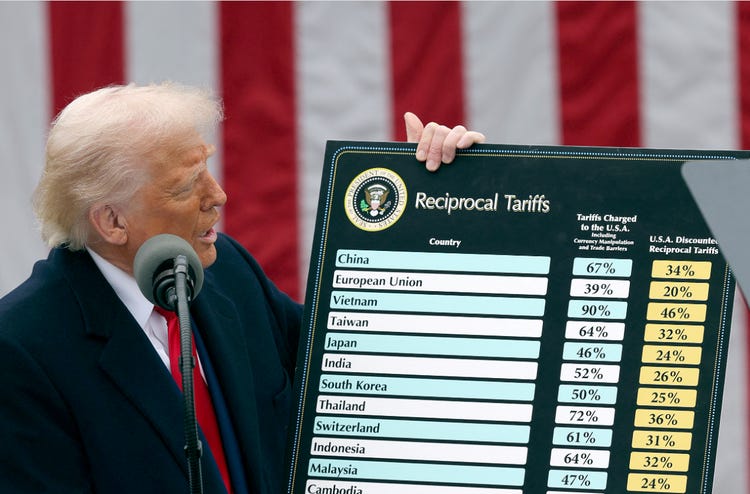Southeast Asia Space Roundup: 8 to 14 May 2025
A summary of all the space news in Southeast Asia over the past week, brought to you by AzurX
The following are the major space developments in the Southeast Asian region tracked by Southeast Asia Space Monitor over the past week:
Soviet Kosmos 482 Splashes Down Near Indonesia
Kosmos 482, a Defunct Soviet Spacecraft, Splashes Down Near Indonesia
The long-defunct Soviet spacecraft Kosmos 482, originally launched in 1972 for a Venus mission, re-entered Earth’s atmosphere and is believed to have fallen into the Indian Ocean near Jakarta, Indonesia, according to Russia’s Roscosmos and corroborated by the European Space Agency. The re-entry near Indonesia underscores the ongoing risks posed by uncontrolled atmospheric returns of legacy space assets, particularly those with dense mass and no active flight control. Indonesian authorities and regional observers may take note as Jakarta was one of several densely populated cities within the projected re-entry corridor, raising concerns about space debris and the need for robust tracking and mitigation strategies in Southeast Asia's increasingly active space environment.
Malaysia Space Developments
Minister: Malaysia Must Cultivate STEM Talent to Participate in $1 Trillion Global Space Economy
At the third installment of MOSTI Tech Talks, Malaysian Science, Technology and Innovation Minister Chang Lih Kang called for a national push to cultivate scientists, engineers, and innovators to unlock Malaysia’s full potential in the expanding global space economy, projected to hit $1 trillion by 2040. Citing the RM1.05 billion revenue generated by Malaysia’s space economy in 2023, Chang underscored the sector's role in bolstering national sovereignty, economic growth, and technological leadership. Supported by MOSTI policies and cross-sector collaboration, the initiative aligns with Malaysia’s high-income aspirations by 2030. Complementing the call to action, Uzma Berhad CEO Dato’ Kamarul Redzuan highlighted the transformative role of satellite technologies in agriculture, logistics, and disaster management, urging youth to view the space sector as a frontier for entrepreneurship and innovation. The session, hosted at Universiti Malaysia Sabah, drew over 250 participants, reaffirming the growing interest in space as a pillar of national development.
Malaysia’s OculloSpace Positions Itself With Unique Biotech & Space Offering
Malaysia-based OculloSpace, under CEO Mohd Zahiruddin Bin Mohd Tohir, is positioning itself as a distinctive force in the Southeast Asian space sector by combining advanced space infrastructure development with deep-rooted human values and educational outreach. Its flagship project, the Elephant Juice mission, embodies this dual mission by using synthetic DNA data storage onboard a PocketQube satellite to preserve personal messages in orbit—merging biotechnology, emotional legacy, and cutting-edge satellite science. Founded by Dr. Franco Gan, the company has forged strategic alliances with NASA, Voyager Space, and Nanoracks, and is advancing a broader ASEAN-focused roadmap that includes educational programs, space infrastructure development, and potential launchpad facilities in the region. OculloSpace’s approach blends democratized space access, public engagement, and sustainable innovation, making it a rising regional player in the global space economy.
Malaysia’s Park Place Technologies Tapped by Azercosmos to Maintain Azerspace-1 Satellite Infrastructure
Malaysia-based Park Place Technologies Sdn Bhd has been awarded a technical support contract by Azerbaijan’s national state space corporation, Azercosmos, to maintain the infrastructure managing the Azerspace-1 satellite. The agreement underscores Azercosmos’ commitment to ensuring the continued operational integrity of its satellite systems. While modest in scale, the partnership highlights the agency's international sourcing strategy for specialized services, and Park Place Technologies’ expanding role in satellite equipment support, despite its core focus on renovation and restoration.
Malaysia’s PWS Partners With Japan’s Tenchijin for Geospatial Analystics to Detect Water Leaks
Tenchijin Inc., a Japan-based space technology firm, has partnered with Malaysia's Premier Water Services (PWS) to distribute its satellite-powered leak detection solution, KnoWaterleak, across key Malaysian regions including Johor, Selangor, and Penang. The agreement, effective 1 May 2025, integrates Tenchijin’s AI-driven Earth observation platform with PWS’s strong foothold in Malaysia’s water sector, aiming to modernize leak detection, improve infrastructure efficiency, and promote sustainable water resource management. KnoWaterleak leverages satellite data and predictive analytics to identify leak-prone zones with high accuracy, offering utilities significant cost and time savings. This partnership positions Malaysia as a regional pioneer in space-based water infrastructure innovation and could serve as a scalable model for other Southeast Asian countries.
Thailand Space News
Thailand’s Thaicom Reports Q1 2025 Financial Results
In Q1 2025, Thailand’s national satellite operator Thaicom reported a core profit of approximately $3.9 million, marking a significant increase from the previous quarter and exceeding its full-year 2024 core profit by about $940,000. The satellite segment alone contributed $4.9 million in core profit, up $3 million year-over-year. However, the company’s net profit of $3.2 million declined due to adverse foreign exchange impacts from the appreciation of the Thai Baht, which affected international revenues. Revenue from sales and services fell by 9.4% quarter-over-quarter to $13.4 million, mainly due to transitional delays in Thailand's Universal Service Obligation (USO) Phase 2 project. Thaicom anticipates a rebound with the upcoming USO Phase 3 project, valued at approximately $156 million, which includes satellite services. Additionally, Thaicom secured a $6.3 million contract with GISTDA to support the THEOS satellite constellation and won a $3.2 million bid from NT for professional services related to THAICOM-4 and -6, reinforcing its strategic position in Thailand’s evolving space ecosystem.
Thailand Participates in U.S. Space Command’s Global Sentinel 2025 Space Security Exercise
Thailand participated in Global Sentinel 2025, U.S. Space Command’s flagship international space security exercise held at Vandenberg Space Force Base, alongside nearly 30 other countries and NATO. The two-week capstone event focuses on enhancing operational collaboration and responsible behavior in space, with particular emphasis on space situational and domain awareness. Thailand’s continued engagement in Global Sentinel underscores its growing commitment to space security and integration into global space governance initiatives. By embedding within Regional Space Operations Centers and participating in real-time modeling and simulation exercises, Thailand joins key spacefaring countries in advancing norms of cooperation and shared strategic understanding in increasingly contested orbital domains.
Thailand’s GISTDA Space Camp Sponsored by Thai Heavyweight BSRC
Bangchak Sriracha Public Company Limited (BSRC) has reinforced its support for STEM education and youth development by sponsoring the GISTDA Space Camp, held from 30 April to 2 May 2025. Organized by Thailand’s Geo-Informatics and Space Technology Development Agency (GISTDA), the camp engaged students in immersive, hands-on learning in space and geo-informatics technologies. At the sponsorship handover, BSRC executives hosted students at its refinery, offering insights into engineering, safety, and environmental practices. The initiative aligns with national goals to foster a value-based learning society and cultivate future talent in science and innovation through sustained collaboration with Thailand’s educational ecosystem.
Philippine Space Developments
Philippine First Lady Attends SpaceX Launch, Advocates for Satellite Connectivity
Philippine First Lady Liza Araneta-Marcos' recent visit to SpaceX's launch facility in Cape Canaveral underscored the Philippines' strategic commitment to leveraging satellite technology—specifically Starlink’s low-Earth orbit system—to enhance digital connectivity across remote and underserved regions of the archipelago. Highlighting the country's early adoption of Starlink in Southeast Asia, the First Lady emphasized its role in bridging the digital divide and enabling inclusive connectivity in the digital era. Her engagements in the U.S. focused on technology, education, and innovation, reflecting Manila’s growing alignment with global space and satellite advancements to drive national development goals.
Filipino Politician Campaigns on Satellite Connectivity in the Philippines
Makati City Rep. Luis Campos Jr. has endorsed the expanded use of satellite internet to connect public schools in remote areas of the Philippines, emphasizing it as a crucial step toward closing digital education gaps. Arguing that no student should be disadvantaged due to geography, Campos highlighted satellite connectivity as a scalable, practical solution for underserved communities where conventional broadband remains unfeasible. He praised the Department of Information and Communications Technology (DICT) for its efforts to link up to 15,000 isolated schools via satellite and urged continued investment in digital infrastructure. Campos, a strong advocate for the Free Wi-Fi for All program and faster mobile internet legislation, underscored the broader economic and educational benefits of improved digital access.
Philippines’ REVLV Solutions Offers Starlink Satellite Internet Services
Philippine-based REVLV SOLUTIONS, led by CEO Ryan Labrador, has positioned itself as a values-driven technology partner delivering scalable, ethical, and innovative ICT solutions tailored to both government and enterprise clients. Since its founding in 2014, the firm has anchored its offerings on three pillars: turnkey software solutions, advanced network and communications engineering—including Starlink satellite broadband for remote connectivity—and comprehensive managed cybersecurity services. Emphasizing bespoke, future-proof systems over generic platforms, REVLV is enabling digital transformation in underserved regions of the Philippines, bridging infrastructure gaps while securing critical data environments. With a strong focus on long-term partnerships, proactive threat mitigation, and mission-aligned service delivery, the company aims to redefine the role of tech providers in the country’s evolving digital landscape.
Web3 Firm Bitget Provides Starlink SATCOM in Remote Areas of Philippines
Bitget, a leading cryptocurrency exchange and Web3 firm, has launched its Starlink Program in Siargao, Philippines, deploying high-speed satellite internet to underserved communities as part of a broader push for digital equity and blockchain inclusion in Southeast Asia. By installing Starlink terminals in schools such as Espoir School of Life and Barangay Pitogo’s public school, Bitget is addressing long-standing infrastructure gaps that hinder education, healthcare, and economic development. The initiative is part of its $20 million commitment through the Blockchain 4 Youth and Blockchain 4 Her programs, aiming to introduce digital finance skills and blockchain literacy. This move underscores the crypto industry's growing recognition that adoption begins with access, and Bitget’s model—anchored in connectivity—could serve as a blueprint for scaling similar efforts across other remote regions in the Philippines and Southeast Asia.
Philippine Space Agency Announces Call for Downstream Data Utilization Course Candidates
The Philippine Space Agency (PhilSA) has launched a call for applications to its Training Course on Downstream Data Utilization, scheduled for 23–27 June 2025 in Mandaluyong City. Targeting educators, researchers, professionals, and graduate students in space science and technology applications (SSTA), the course will cover key areas such as remote sensing, satellite data utilization, GIS, digital image processing, and spatial analysis. Limited to 30 participants, the training is part of PhilSA’s broader effort to strengthen national capabilities in satellite data use and to promote public understanding of space science. While tuition and meals are covered, participants are responsible for other expenses. Applications, including endorsement letters and documentation, are due by 30 May 2025, and may be submitted online or via email. This initiative underscores PhilSA’s commitment to building a skilled space science workforce and expanding downstream satellite applications in the Philippines.
Vietnam Space News
Report: Vietnam, Other Countries, Greenlighted Starlink to Mitigate U.S. Tariffs
Vietnam has emerged as one of the countries reportedly accommodating Starlink's expansion as part of broader U.S. diplomatic efforts to support American satellite firms abroad. According to internal State Department cables obtained by The Washington Post, the U.S. government has encouraged countries—including Vietnam—to grant regulatory approvals for Starlink, in parallel with trade negotiations and broader strategic positioning against Chinese and Russian telecommunications rivals. Although details on the scope of Vietnam’s agreement remain limited, its inclusion alongside markets like India and Bangladesh underscores Starlink’s growing role in American trade diplomacy. This approach reflects Vietnam’s rising relevance in the global space and telecom sector, where access to low-Earth orbit (LEO) satellite internet is increasingly tied to geostrategic and commercial alignment with the United States.
Vietnam and Russia to Undertake Significant Space Cooperation
During General Secretary To Lam’s official visit to Russia, Vietnam and the Russian Federation reaffirmed their commitment to using outer space exclusively for peaceful purposes and called for an international legally binding instrument to prevent the weaponization of space. The two countries emphasized strengthening cooperation in space science, satellite technology, digital transformation, and high-tech human capital development. Vietnam and Russia also pledged to accelerate the construction of a Nuclear Science and Technology Center in Vietnam and deepen joint research at the Vietnam-Russia Tropical Center, including transferring the scientific research vessel Professor Gagarinsky. Both sides committed to closer collaboration in Earth observation, digital innovation, and information security, positioning their space cooperation as a key pillar of the Vietnam–Russia Comprehensive Strategic Partnership in this new phase.

Vietnam and Russia Issue Joint Statement Reaffirming Commitment to Peaceful Uses of Outer Space
In a joint declaration on strategic partnership guidelines, Vietnam and Russia reaffirmed their commitment to preventing an arms race in outer space and promoting the peaceful use of space. Both countries expressed strong support for international arms control and non-proliferation efforts and called for the swift launch of negotiations on a legally binding treaty to prohibit the placement of weapons in outer space. The declaration also endorses a political initiative to prevent the first deployment of space-based weapons, underscoring a shared diplomatic stance on maintaining space as a domain for peaceful cooperation.
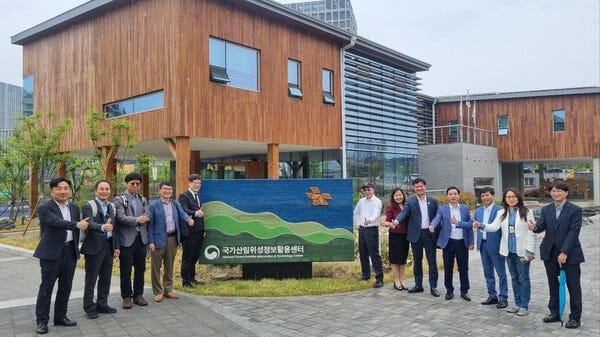
Vietnam and South Korea Cooperate on Remote Sensing for Forestry Applications
South Korea’s Korea Forest Service (KFS) and Vietnamese forestry officials, including Vietnam National University of Forestry representatives, convened in Seoul to advance cooperation on REDD+ forest carbon projects, with a strong focus on satellite-based monitoring, remote sensing, and geospatial technologies. Vietnam proposed piloting REDD+ models that integrate AI-driven analysis, satellite imagery, and GIS tools to enhance forest conservation and carbon accounting. The two countries agreed to initiate district-level pilots and deepen technical collaboration, aiming for measurable emissions reductions. An MOU later this year will formalize these efforts, supporting KFS’s target of achieving 5 million tons of verified international carbon offsets through satellite-enhanced forest monitoring.
Other Regional Space Developments
Interest in a Singapore Spaceport Revives As City-State Becomes Regional Space Hub
While Singapore has no immediate plans to build a spaceport, growing interest from international players like Virgin Galactic, the country’s equatorial advantage, and a flourishing satellite sector suggest real long-term potential. The idea of a Singapore-based spaceport, originally proposed in 2006, has resurfaced amid rising commercial interest in suborbital space tourism and horizontal launch platforms. Industry experts cite Singapore’s strategic location, strong aerospace infrastructure, and supportive regulatory environment as major assets, particularly for launches requiring equatorial boosts or point-to-point space transportation. However, land constraints and regional airspace coordination remain challenges. With over 70 space companies and 2,000 professionals already active in satellite technologies, Singapore’s future role as a regional space hub—possibly including sea-based launches—remains a credible prospect within the evolving Southeast Asian space economy.
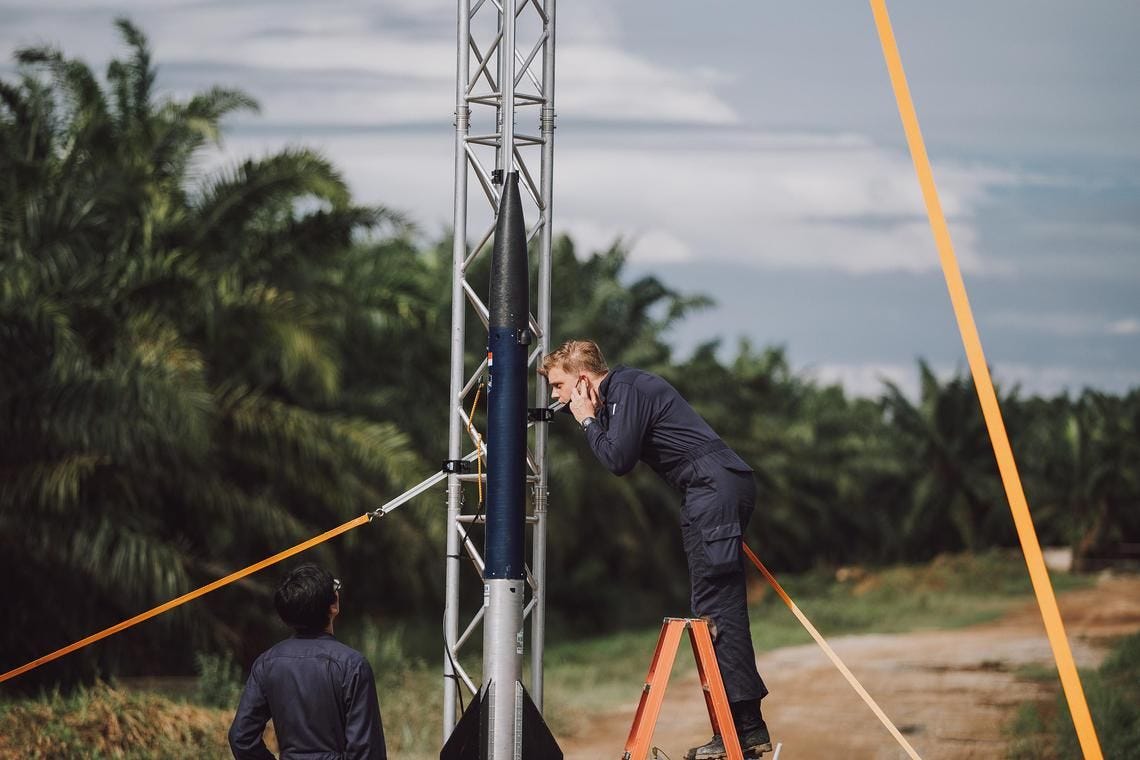
Small GEO Satellite Manufacturers Find Traction in Southeast Asia Market
Southeast Asia is emerging as a strategic growth frontier in the shifting geostationary satellite (GEO) communications market, driven by rising demand for sovereign satellite capabilities and national broadband services. Thailand’s Thaicom and Singapore’s Astrum Mobile are notable regional players embracing next-generation small GEO satellites—built by Astranis and Swissto12 respectively—to reach underserved areas with flexible, lower-cost connectivity solutions. In Malaysia, energy-tech firm Uzma is pioneering local adoption via a GEO order from Finland’s ReOrbit. These developments reflect a broader pivot in Southeast Asia, including the Philippines and Indonesia, where geography, connectivity gaps, and strategic autonomy are accelerating interest in satellite-based services. As legacy operators retreat from declining TV revenues, small GEO platforms—particularly those tailored to Southeast Asia’s unique topography and market demands—are positioning the region at the forefront of satellite innovation, sovereign capability building, and public-private space partnerships.
Regional Officials Express Growing Concern About Criminal Use of Starlink SATCOM
The use of SpaceX’s Starlink satellite internet service by criminal syndicates operating scamming compounds in Myanmar has drawn international concern, highlighting the challenges of regulating satellite-based connectivity. Despite being unauthorized in Myanmar, Starlink terminals—smuggled into border areas such as Myawaddy—are enabling fast, resilient internet access for criminal operations, particularly amid crackdowns that have cut off traditional telecom infrastructure. Authorities from China and Thailand have disrupted some of these compounds, but experts and lawmakers warn that satellite internet now bypasses conventional enforcement measures. Erin West, founder of Operation Shamrock, and Thai MP Rangsiman Rome have both called for urgent intervention by SpaceX, citing real-world consequences. Meanwhile, as SpaceX officials met with leaders from Cambodia to discuss regional expansion, critics warned that without robust regulatory safeguards, Starlink risks becoming a critical enabler of illicit activities across Southeast Asia and beyond.
Be sure to catch up with space activities in the region in the next edition of Southeast Asia Space Monitor’s space roundup!
Follow Southeast Asia Space Monitor on X at: @SEAsia_Space and on BlueSky at: @seasiaspacemonitor.bsky.social

